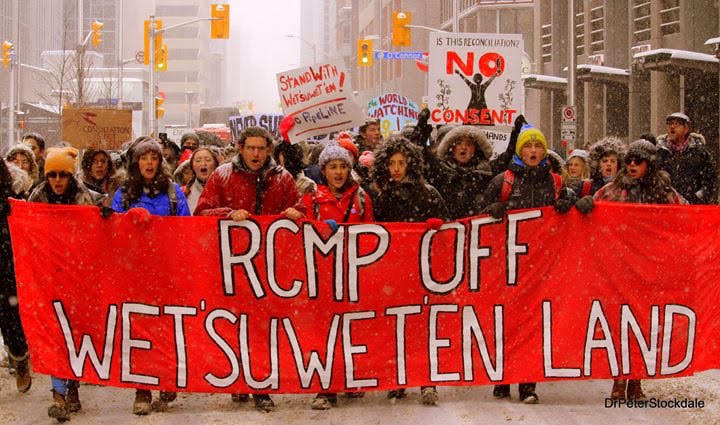 The International Civil Liberties Monitoring Group (ICLMG) condemns the RCMP’s armed invasion of unceded Wet’suwet’en territory, and the ongoing repression and criminalization of Wet’suwet’en land defenders, their supporters and journalists.
The International Civil Liberties Monitoring Group (ICLMG) condemns the RCMP’s armed invasion of unceded Wet’suwet’en territory, and the ongoing repression and criminalization of Wet’suwet’en land defenders, their supporters and journalists.
The ICLMG is a coalition of 46 organizations across Canada, based in Ottawa on unceded Algonquin land. The ICLMG’s primary focus is on the impact of national security and anti-terrorism laws and activities on civil liberties and human rights in Canada and internationally.
The coalition has long-expressed its concerns about how national security is used to stigmatize and criminalize land defenders. The ICLMG opposes the increased use of language of “critical infrastructure” and “national security” to describe and justify the Coastal GasLink natural gas pipeline and the RCMP’s actions to enforce an injunction1 to remove Wet’suwet’en land defenders and their supporters from their territory. This language serves to position resource development and the extraction of fossil fuels as superseding Indigenous rights, and to paint the defense of those rights as threatening Canada’s “national security.”
It is also important to note that the language of “national security” and “critical infrastructure” can serve to trigger national security laws, particularly the Security of Canada Information Disclosure Act, allowing the disclosure of individuals’ private information by government departments with federal security agencies. While this sharing occurs in secret, it is reviewed annually by the National Security and Intelligence Review Agency (NSIRA), and we urge the NSIRA to pay particular attention to this issue in its upcoming work.
The ICLMG also condemns the RCMP’s portrayal of the peaceful opponents to the Coastal GasLink project as “radicalized” and the agency’s profiling of Indigenous land protectors through programs like Project SITKA, including several individuals connected with the Wet’suwet’en Healing Centre, camps and access point built on Wet’suwet’en territory. This language reflects an approach based on criminalization and linking land defenders to national security and terrorism threats, contradicting Canada’s stated commitment to reconciliation and upholding Indigenous rights.
These actions by the RCMP, and support by both the BC and federal governments, cannot be separated from the historical context of the RCMP’s predecessor, the North-West Mounted Police, being created as part of Canada’s colonial project in order to assert sovereignty over Indigenous peoples and their lands. For Canada to truly break with this history, it must immediately withdraw the RCMP and respect the Wet’suwet’en’s sovereignty over their territories.
The ICLMG also denounces the detention, removal and exclusion of journalists reporting on the conflict. Prohibiting journalists from carrying out their work during the RCMP’s armed invasion is a clear violation of free expression and press freedom, denying the press the ability to carry out its important work of ensuring accountability and transparency.
Finally, we share the grave concerns raised by the BC Civil Liberties Association, Union of BC Indian Chiefs and others in their complaints filed with the Civilian Review and Complaints Commission for the RCMP. This includes condemning the “overbroad scope as well as inconsistent and arbitrary exercise of RCMP discretion in Wet’suwet’en territories.”2 As they write:
“The RCMP implementation and enforcement of the exclusion zone criminalizes and impedes the movement of Wet’suwet’en people, invited guests of the Wet’suwet’en, media, legal counsel as well as food and medical supplies.”3
And: “There is absolutely no legal precedent nor established legal authority for such an overbroad policing power associated with the enforcement of an injunction. The implementation and enforcement of the RCMP exclusion zone in Wet’suwet’en territory is unlawful.”4
The ICLMG believes that the security and safety of people living in Canada will be achieved through the respect of fundamental rights and liberties, including the respect and recognition of Indigenous rights, and not through the stigmatization of land defenders as “radicalized” threats and the use of armed invasions and arrests. In light of this, we call for an immediate withdrawal of the RCMP from Wet’suwet’en territory, and for the government to respect Wet’suwet’en law and the Hereditary Chiefs’ authority over their traditional territory.
For more information & to donate:
Unistoten Camp
Gidimt’en Access Point
RAVEN Trust Wet’suwet’en Legal Challenge Fund
——-
1 In its 1997 decision in Delgamuukw vs BC, the Supreme Court of Canada recognized that constitutionally-protected Aboriginal title includes the right to use, enjoy, benefit from, occupy and pro-actively manage the land. Available at: https://scc-csc.lexum.com/scc-csc/scc-csc/en/item/1569/index.do. See also: Hernandez, J. ‘’We still have title’: How a landmark B.C. court case set the stage for Wet’suwet’en protests”, CBC News, Feb. 13, 2020. Available at: https://www.cbc.ca/news/canada/british-columbia/delgamuukw-court-ruling-significance-1.5461763; and Gunn, K. & B. McIvor, “The Wet’suwet’en, Aboriginal Title, and the Rule of Law: An Explainer”, First Peoples Law, Feb. 13, 2020. Available at: https://www.firstpeopleslaw.com/index/articles/438.php: “The Indian Act does not provide authority for a Chief and Council to make decisions about lands beyond the boundaries of the First Nation’s reserves. By contrast, the Hereditary Chiefs are responsible under Wet’suwet’en law and governance for making decisions relating to their ancestral lands.”
2 BCCLA letter to Michelaine Lahaie, Chairperson, Civilian Review and Complaints Commission for the RCMP, “Re: Policy Complaint Concerning RCMP Checkpoint on Morice West Forest Service Road,” Jan. 29, 2020. Available at: https://bccla.org/wp-content/uploads/2020/01/RCMP-Complaint-Public.pdf
3 Ibid.
4 BCCLA letter to Michelaine Lahaie, Chairperson, Civilian Review and Complaints Commission for the RCMP, “Re: Policy Complaint and Public Interest Investigation Concerning RCMP Exclusion Zone and RCMP Operations on Morice West Forest Service Road,” Feb. 9, 2020. Available at: https://bccla.org/wp-content/uploads/2020/02/Policy-Complaint-Update-RCMP-Operations-in-Wetsuweten-2020.pdf
